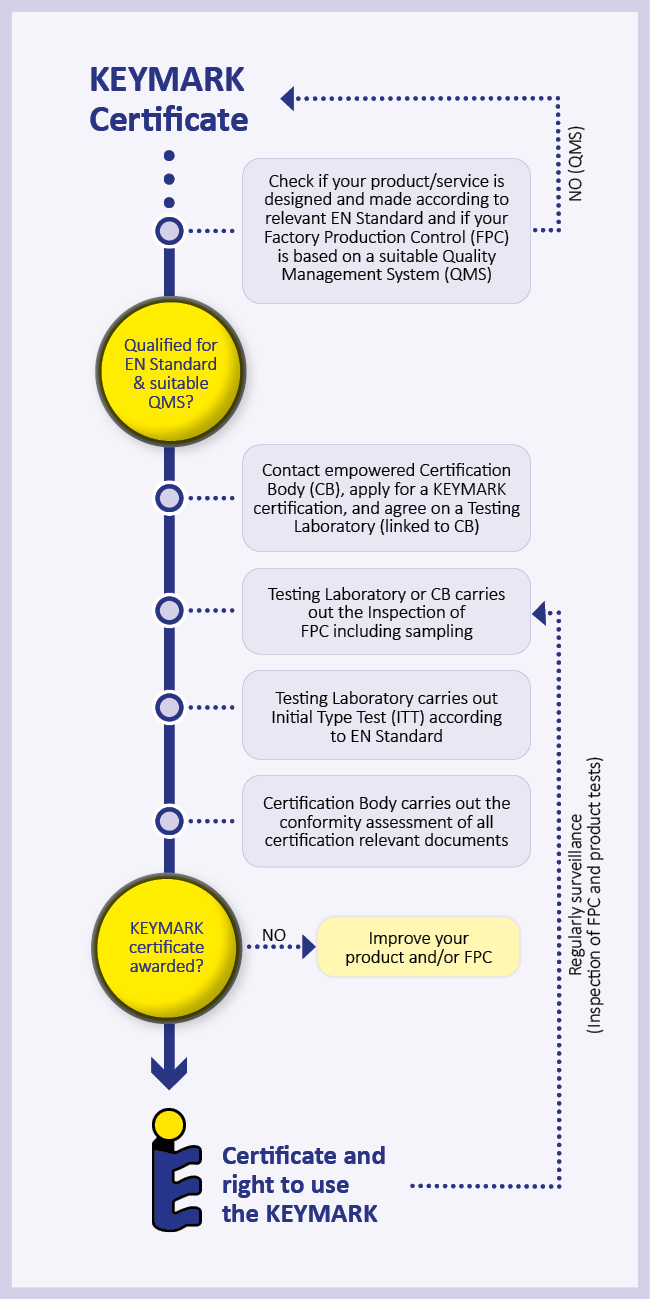KEYMARK Scheme Rules and Requirements
Everybody is invited to participate in the development of new Scheme Rules according to KEYMARK requirements defined in the CEN-CENELEC Internal Regulations Part 4. If you have an idea for a new certification, please contact This email address is being protected from spambots. You need JavaScript enabled to view it..
The development of new Scheme Rules is carried out by Scheme Groups of interested parties (Certification Bodies, Testing Laboratories and Inspection Bodies, as well as manufacturers' associations and other interests- and industry representatives). Based on one or more valid European product Standards, a certification scheme is developed and submitted to KMO for final approval on behalf of CEN.
Templates and the guidance document describing the development process can be found under documents.
Basic Principles
In principle all existing European standards containing product requirements, which can be evaluated according to standardized test methods, can act as a basis for certification in accordance with a KEYMARK Scheme. To be suitable as reference standard for the KEYMARK, a European standard has to be accepted as such by CEN-CENELEC. In principle all existing certification schemes demonstrating compliance of products with European standards, and being in conformity with the rules of the KEYMARK system, can act as KEYMARK Scheme.
A KEYMARK Scheme has to be developed by a KEYMARK Scheme Group and has to be approved by KMO on behalf of CEN.
General Requirements
The KEYMARK Scheme Rules shall conform to these CEN-CENELEC Internal Regulations. Their sole purpose is to complement the KEYMARK System by specifying the particular provisions in order to make individual schemes operational, and to ensure the technical harmony of all actions taken for the implementation.
A KEYMARK Scheme shall cover conformity assessment issues corresponding to the third party certification Scheme Type 5, as defined in ISO/IEC 17067 “Conformity assessment - Fundamentals of product certification and guidelines for product certification schemes”
The KEYMARK Scheme shall contain provisions for the limitation of the validity period for the right to use the KEYMARK, taking into account possible amendments or revisions of the European standard(s) or, in cases where the standards have not been modified during a defined period, to fix the rules for re-evaluation of the products. The period of validity shall be stated in the licence. KEYMARK Scheme rules shall include at least the following requirements:
- The provision that empowered Certification Bodies shall be located in CEN-CENELEC member countries or countries of CEN-CENELEC Affiliates;
- The evidence of conformity of the product(s) with the requirements of the appropriate European standard(s) shall be based on type testing performed by a third-party testing laboratory;
- The client shall operate a quality management system covering the production line of the product for which the licence to use the KEYMARK is granted and which should be based on the quality standards which are at least of the level of ISO 9001;
In granting the licence, the empowered Certification Body shall take into account the existence of any quality management system certificate issued by a Certification Body that is accredited by a Member of the European co-operation for Accreditation (EA);
- Periodic surveillance by the empowered Certification Body including testing of samples from the production line or from the market and surveillance of the client’s quality management system.
Specific Requirements
The rules of a KEYMARK Scheme shall include at least the following subjects:
- Title;
- Definition of scope, including:
- products covered by the scheme
- the list of European standards concerned;
- Requirements and assessment procedures for bodies engaged in certification, testing and inspection taking part in the scheme;
- Specifications for the content of the customer’s application file (e.g. related to the product(s), its/their design, materials and the production process, the customer’s internal quality management system, including testing facilities, calibration, etc.);
- Requirements for:
- selection and submission of type test samples for the purpose of granting the licence to use the KEYMARK;
- initial assessment of the production site, especially the quality management system (insection of the Factory Production Control);
- surveillance (e.g. normal frequency of inspection and routine tests and nature of tests performed for surveillance). This section includes the normal period of validity of the licence;
- the quality management system of the relevant production line under the responsibility of the client;
- Requirements for labelling with the KEYMARK;
- The indication whether procedures such as "supervised manufacturers’ testing" and/or "testing at manufacturers’ premises" can be used and the specification of the rules for such procedures;
- The list of conformity assessment bodies for the implementation of the scheme;
- The fees for the right to use the KEYMARK and the administrative application fees .
Provisions Covering Special National Conditions or A-Deviations
The rules of a KEYMARK Scheme shall also include provisions on how the related scheme will deal with special national conditions and A-deviations, included in the relevant European standard(s). If necessary, these provisions shall require the empowered Certification Bodies when grantin the KEYMARK, to:
- Include in the licence a clear indication of the CEN-CENELEC National Member countries in which the product carrying the KEYMARK does not comply with the relevant special national conditions and A-deviations;
- Ensure that the customer will put on the product or its package, where this is not obvious to the consumers and users, the indication Not for use in (list of countries) for products which do not comply with the relevant special national conditions and Adeviations.
DOCUMENTS

